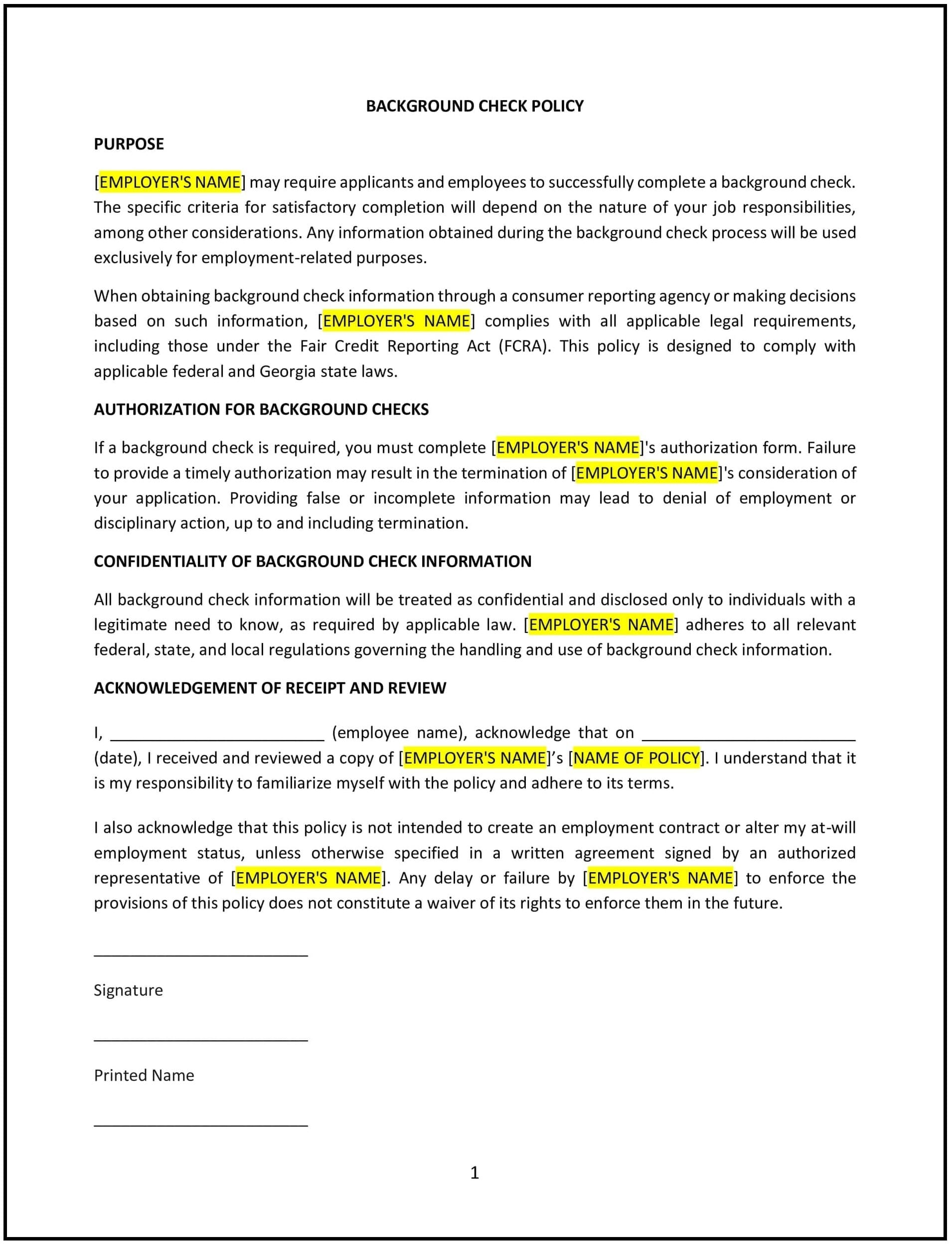Got contracts to review? While you're here for policies, let Cobrief make contract review effortless—start your free review now.

Customize this template for free
Background check policy (Georgia)
This background check policy is designed to help Georgia businesses make informed hiring decisions by establishing clear guidelines for conducting pre-employment background checks. The policy outlines when and how checks will be conducted, what information will be reviewed, and how results will be used to support fair and consistent hiring practices.
By implementing this policy, businesses can minimize hiring risks, protect organizational integrity, and maintain a transparent process for evaluating candidates.
How to use this background check policy (Georgia)
- Define the scope of background checks: Clearly outline what types of background checks will be conducted, such as criminal history, employment verification, education verification, and credit checks (if applicable).
- Establish when checks will occur: Specify at what stage of the hiring process background checks will be conducted, such as after a conditional offer of employment is made.
- Obtain candidate consent: Ensure candidates provide written consent before conducting background checks. Clearly communicate the purpose of the checks and how the information will be used.
- Identify disqualifying factors: Outline which findings may impact hiring decisions, such as specific criminal convictions or discrepancies in employment history. Ensure that criteria are job-related and applied consistently.
- Include third-party screening requirements: If using a third-party service, ensure they comply with federal and Georgia-specific laws governing background checks, such as the Fair Credit Reporting Act (FCRA).
- Protect candidate privacy: Specify how sensitive information will be handled, stored, and accessed to ensure confidentiality and protect against unauthorized disclosure.
- Provide candidates with an opportunity to respond: If adverse action may be taken based on the results of a background check, provide candidates with the opportunity to review the findings and address discrepancies.
- Review and update regularly: Periodically review the policy to ensure it reflects current Georgia laws, industry practices, and organizational needs.
Benefits of using this background check policy (Georgia)
Implementing this policy provides several advantages for Georgia businesses:
- Reduces hiring risks: Background checks help identify potential risks by verifying candidate qualifications and uncovering relevant history.
- Protects organizational integrity: Clear guidelines ensure fair and consistent decision-making, enhancing the organization's reputation and trustworthiness.
- Promotes workplace safety: Background checks can identify potential safety risks, contributing to a secure and productive work environment.
- Supports legal compliance: The policy helps businesses navigate Georgia-specific regulations and federal requirements governing background checks.
- Enhances candidate transparency: By communicating the process clearly, businesses build trust with candidates and promote transparency throughout the hiring process.
Tips for using this background check policy (Georgia)
- Communicate the policy clearly: Ensure candidates understand the purpose and scope of background checks during the hiring process. Include information about consent requirements and how results will be handled.
- Apply consistently: Use the same standards and criteria for all candidates applying for the same position to ensure fairness and avoid claims of bias.
- Limit checks to job-relevant information: Tailor background checks to the specific requirements of the position to avoid unnecessary invasions of privacy.
- Stay updated on Georgia laws: Regularly review Georgia-specific regulations related to background checks to ensure the policy remains compliant and relevant.
- Monitor third-party vendors: If outsourcing background checks, work with reputable vendors who understand and comply with legal requirements.